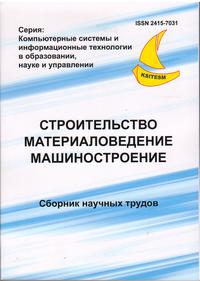New methods for mathematical simulation of the dynamics of competence formation in the education process
Keywords:
cognitive approach, competence formation, intuitive and creative thinking, creativity, natural logic, paradigm of limiting generalizationsAbstract
Abstract. Purpose. Existing educational technologies are aimed at developing the verbal component of thinking on the basis of artificial logical schemes. In doing so, there is little, if any, purposeful development of intuitive image thinking, which i s based on natural logic. This is due, first of all, to the lack of adequate mathematical models of the adaptive unconscious, which would reveal the genesis of implicit inherent knowledge. The aim of this work is (1) the construction of a mathematical model of implicit formation of “thin sections” (limiting sense) in discrimination problems (diagno sis, forecasting, management), (2) the formulation of a new ecologic paradigm of education, and (3) the development of a methodology for cognitive simulator construction. Methodology. The authors propose that the work of intuitive image component of an individual, including decision making, be simulated on the basis of natural logic in the framework of a limiting generalization paradigm. Natural logic leads to the origination of rati onality as an adaptive tool, which is not identical to the rules of formal or fuzzy logic or to the rules of probability calculus. Findings. In any Zproblem of discrimination of the basis of a test bank (qualia bank), a cognitive categorization operator is defined, and, usi ng it, an epistemological series is implicitly formed. Advancement along the series means a growth of Z-competence. The limit of the series is a “thin section” containing invariants (“internal codes”), with the help of which images of the world are coded. A failure to reach the limit results in cognitive deficiency. Originality. The limiting generalization paradigm made it possible to develop the system basics of educational technologies that allow one to overcome cognitive deficiency and thus to educate expert-level specialists. Practical value. The proposed model is a methodological basis for the development of ecologic educational techniques, which would develop, first of all, the intuitive image component of thinking. The model also suggests ways to develop broad -spectrum cognitive simulators.
References
Kognitivnyy vyzov i informatsionnyye tekhnologii [The Cognitive Challenge and Information Technology]/ G. G. Malinetskiy. S. K. Manenkov. N. A. Mitin. V. V. Shishov // Vestnik RAN [Herald of the Russian Academy of Sciences]. – 2011. –T. 81. № 8. – S. 707–716. (in Russsian)
Mayer R.V. Modelirovaniye kak metod izucheniiya didakticheskikh sisem [Modeling as a method of the didactic system research] // Bulletin of science and practice, 2016. №9 (10). Pp. 227–234. DOI: 10.5281/zenodo.154300. Available at: http://www.bulletennauki.com/maier . (in Russsian)
Meskov V.S. and Mamchenko A.A. [Cognitive and Competence Paradigm of Education}. Shkolnye tekhnologii [School Technologies] 3 (2011): 46—62. . (in Russsian)
Prokopchuk Yu. A. Kognitivnyye informatsionnyye tekhnologii v zadachakh upravleniya i prinyatiya resheniy: problemy I resheniya [Cognitive information technologies in management tasks and decision-making: problems and solutions]/ Yu. A. Prokopchuk // Sotsіalno-ekonomіchniy ta tekhnіchniy rozvitok pіdpriєmstv: problemi. rіshennya. otsіnka efektivnostі: kolektivna monografіya. – Dnіpropetrovsk : Porogi Publ. 2016, pp. 513 - 525. . (in Russsian)
Prokopchuk, Yu. A. . Modeli kognitivnykh arkhitektur I protsessov na osnove paradigm predelnykh obobshcheniy [Models of cognitive architectures and processes on the basis of a paradigm of limiting generalizations]. Cybernetics and computer engin eering, 2013, issue 171, pp 37–51. (in Russsian)
Prokopchuk Yu.A. Paradigma predelnykh obobshcheniy: modeli kognitivnykh arkhitektur i protsessov [The paradigm of limiting generalizations: models of cognitive architectures and processes]. - Saarbrucken. Deutschland: LAP LAMBERT Academic Publishing. 2014. – 204 p. (in Russsian)
Prokopchuk, Yu. A. Printsip predelnykh obobshcheniy: metodologiya, zadachi, prilogeniya [Principle of Limiting Generalizations: Methodology, Problems, and Applications]. Monograph. Dnepropetrovsk, Institute of Technical Mechanics of the NAS of Ukraine Publ., 2012, 384 p. (in Russsian)
Burov V. and A. V. Burova The Man on the Border of the Potential and Actual: The Performance of Knowledge, Technology of the Second Order // Procedia - Social and Behavioral Sciences. Volume 86, 2013, Pp. 165-171.
Gladwell M. Blink: The Power of Thinking Without Thinking . — Back Bay Books, 2007, 320 p.
Halpern, D. F. Thought and Knowledge: An Introduction to Critical Thinking (5th Edition)., - NY: Psychology Press, 2014, 451 p.
Maldonato M.and Dell'Orco S. Natural Logic: Exploring Decision and Intuition. – UK: Sussex Academic Press, 2011, 112 p.
Downloads
Published
Issue
Section
License
Редакція Видання категорично засуджує прояви плагіату в статтях та вживає всіх можливих заходів для його недопущення. Плагіат розглядається як форма порушення авторських прав і наукової етики.
При виявлені у статті більш ніж 25% запозиченого тексту без відповідних посилань та використання лапок, стаття кваліфікується як така, що містить плагіат. У цьому випадку стаття більше не розглядається редакцією, а автор отримує перше попередження.
Автори, в статтях яких повторно виявлено плагіат, не зможуть публікуватися в усіх журналах Видавництва ДВНЗ «Придніпровська державна академія будівництва та архітектури».
Автори, які публікуються у цьому журналі, погоджуються з наступними умовами:
- Автори залишають за собою право на авторство своєї роботи та передають журналу право першої публікації цієї роботи на умовах ліцензії Creative Commons Attribution License, котра дозволяє іншим особам вільно розповсюджувати опубліковану роботу з обов'язковим посиланням на авторів оригінальної роботи та першу публікацію роботи у цьому журналі.
- Автори мають право укладати самостійні додаткові угоди щодо неексклюзивного розповсюдження роботи у тому вигляді, в якому вона була опублікована цим журналом (наприклад, розміщувати роботу в електронному сховищі установи або публікувати у складі монографії), за умови збереження посилання на першу публікацію роботи у цьому журналі.
- Політика журналу дозволяє і заохочує розміщення авторами в мережі Інтернет (наприклад, у сховищах установ або на особистих веб-сайтах) рукопису роботи, як до подання цього рукопису до редакції, так і під час його редакційного опрацювання, оскільки це сприяє виникненню продуктивної наукової дискусії та позитивно позначається на оперативності та динаміці цитування опублікованої роботи (див. The Effect of Open Access).

